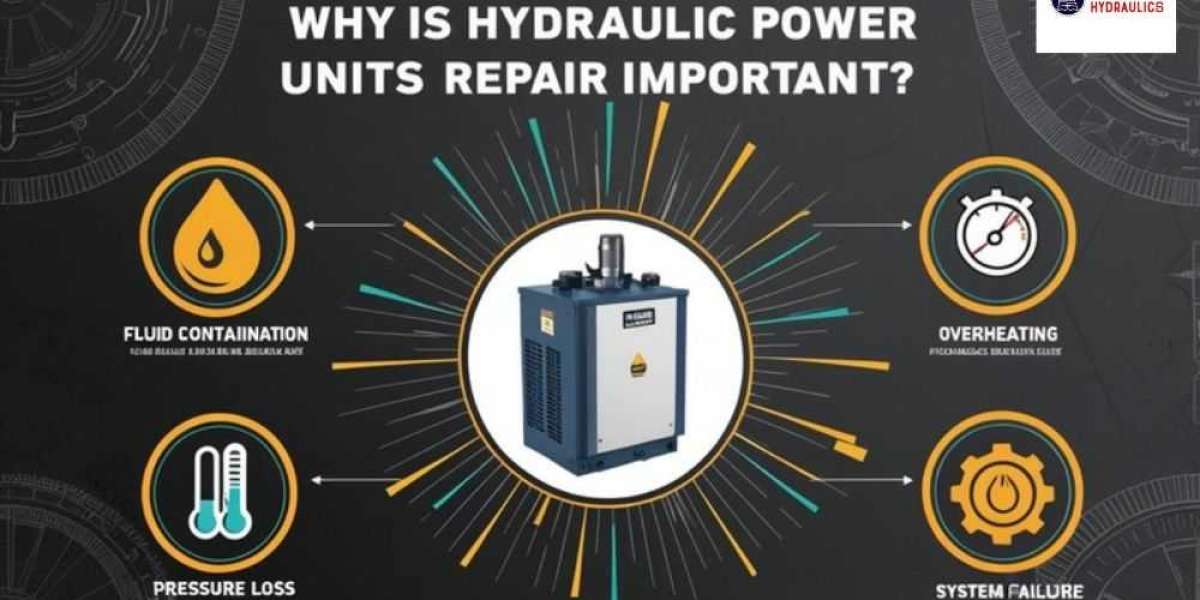Hydraulic systems are the backbone of countless industrial, marine, and mobile equipment operations across the globe. At the core of these systems lies the Hydraulic Power Unit (HPU)—a vital component that supplies pressurized fluid to drive cylinders, motors, and other hydraulic actuators. The proper functioning of an HPU ensures smooth and efficient operations, which makes the repair and maintenance of these units critically important.
In this article, we delve into the key reasons why hydraulic power units repair is essential, exploring the components involved, common failure issues, the impact of neglect, and the long-term advantages of timely service.
Understanding Hydraulic Power Units
A Hydraulic Power Unit is an integrated system that consists of various components working together to generate, control, and distribute hydraulic energy. These components typically include:
- Electric motor or engine
- Hydraulic pump
- Reservoir/tank
- Valves and filters
- Accumulators and pressure regulators
- Cooling and heating elements
The primary role of an HPU is to provide a constant flow of hydraulic fluid to drive various functions in a wide array of machinery—from manufacturing equipment and construction machinery to offshore rigs and military systems.
The Role of Repair in Maintaining Hydraulic Performance
Hydraulic power units are subject to extreme pressure, fluctuating temperatures, and continuous operation. Over time, wear and tear is inevitable. The repair of these systems isn’t just about fixing what’s broken—it’s about maintaining efficiency, preventing future damage, and ensuring safety.
When hydraulic power units are regularly repaired and maintained, the benefits include:
- Consistent system performance
- Reduced risk of unexpected breakdowns
- Lower long-term operational costs
- Increased equipment lifespan
- Enhanced workplace safety
Let’s explore these factors in greater depth.
Prevention of Operational Downtime
Downtime is one of the most significant challenges in industries that rely on hydraulic systems. If a hydraulic power unit fails, it can halt an entire production line or bring heavy machinery to a standstill. This type of unplanned downtime can result in missed deadlines, loss of revenue, and dissatisfied clients.
Timely repair and preventive maintenance significantly reduce the likelihood of such failures. Whether it's replacing worn-out seals, repairing a leaking pump, or addressing a drop in pressure, proactive attention to HPUs ensures that operations continue without interruption.
Protection Against Expensive Component Failures
Hydraulic power units consist of multiple interconnected components. A failure in one part, if left unaddressed, can cause a domino effect, damaging other parts of the system.
For example, a clogged filter can reduce oil flow to the pump, leading to overheating or cavitation. If the pump fails, debris could contaminate the entire system, damaging valves, actuators, and even control systems.
By investing in regular hydraulic power units repair, such catastrophic and costly system-wide failures can be avoided. It’s far less expensive to repair a small fault than to replace a full hydraulic system.
Improved Efficiency and System Performance
Hydraulic power units are engineered for high-efficiency performance. However, system efficiency deteriorates when components are not operating at their optimal level. Common symptoms include:
- Sluggish movement of actuators
- Overheating
- Noise or vibration
- Reduced pressure output
Regular repair and servicing of the HPU, including the motor, pump, and valves, ensures that the system performs at peak efficiency. This leads to faster cycle times, more consistent output, and reduced energy consumption.
Compliance with Safety and Industry Standards
In industries such as oil and gas, marine, aerospace, and heavy manufacturing, safety is paramount. Equipment failure due to poor maintenance can lead to serious accidents, environmental hazards, and regulatory penalties.
Repairing hydraulic power units is not just about performance—it’s also about compliance. In many sectors, periodic inspection and certification of hydraulic systems are mandatory. Properly maintained HPUs demonstrate due diligence and adherence to safety standards set by governing bodies such as:
- ISO (International Organization for Standardization)
- OSHA (Occupational Safety and Health Administration)
- ABS (American Bureau of Shipping)
- DNV (Det Norske Veritas)
Addressing Common Hydraulic Power Unit Failures
To understand the importance of timely repair, it helps to recognize some of the most frequent issues found in hydraulic power units:
Fluid Contamination
Contaminated hydraulic fluid is a leading cause of system failure. Dirt, water, or metal particles can enter the system through worn seals, faulty filters, or improper maintenance practices. Over time, this contamination wears down internal surfaces, leading to reduced performance and potential system failure.
Seal and Hose Deterioration
Seals, hoses, and fittings degrade due to age, chemical exposure, or extreme pressure. Once a leak develops, the system may lose pressure or become contaminated. Timely replacement of these components during repair prevents further complications.
Pump and Motor Wear
Hydraulic pumps and motors are constantly under stress. Without regular inspection and maintenance, these components can overheat, seize, or lose efficiency. Rebuilding or replacing a worn motor or pump during routine repair helps preserve system functionality.
Valve Malfunctions
Directional, pressure, and flow control valves regulate the behavior of hydraulic systems. If a valve sticks or leaks, the system may behave unpredictably. Valve calibration, cleaning, or replacement is a common and necessary repair procedure.
The Role of Predictive and Preventive Maintenance
To reduce the need for emergency repairs, many companies adopt a preventive or predictive maintenance strategy.
- Preventive Maintenance involves scheduled inspections, cleaning, fluid replacement, and minor repairs.
- Predictive Maintenance uses sensors and data analytics to monitor real-time performance and predict when a repair will be needed.
Both strategies help identify issues before they cause failure, allowing for scheduled repairs and minimizing costly downtime.
Cost Benefits of Hydraulic Power Units Repair
One of the main reasons companies delay hydraulic repairs is concern over cost. However, the reality is that timely repairs save money in the long term.
Here’s how:
- Avoiding major failures prevents expensive part replacements.
- Efficient systems consume less energy, reducing operating costs.
- Well-maintained systems last longer, lowering capital expenditures.
- Preventing breakdowns minimizes costly downtime and lost productivity.
In essence, repair is an investment in the longevity and profitability of operations.
Selecting the Right Repair Service Provider
The quality of repair service plays a pivotal role in ensuring system reliability. When choosing a hydraulic repair service, consider the following:
- Experience and certifications
- Access to genuine parts
- Availability of diagnostic tools
- Warranty on repairs
- Response time and field support
Working with a trusted hydraulic repair partner ensures that repairs are carried out correctly, using proper techniques and high-quality components.
Best Practices for Extending HPU Lifespan
In addition to scheduled repairs, adopting best practices in daily operations can significantly extend the life of your hydraulic power unit:
- Use only clean, recommended hydraulic fluid.
- Maintain optimal fluid temperature and pressure.
- Regularly inspect and replace filters.
- Monitor fluid levels and look for signs of leaks.
- Train operators in proper usage and early fault detection.
These practices, combined with periodic professional repair, create a sustainable maintenance framework that enhances reliability and performance.
Conclusion
Hydraulic power units are the driving force behind numerous hydraulic systems used across critical industries. Their uninterrupted operation is essential for efficiency, safety, and cost management. Understanding why hydraulic power units repair is important empowers operators, maintenance teams, and business owners to prioritize preventive care and timely intervention.
A well-maintained HPU ensures reduced downtime, lower operational costs, improved safety, and extended equipment life. In an era where productivity and reliability are key differentiators, investing in regular and professional repair of hydraulic power units is not just smart—it’s essential.
For more insightful articles related to this topic, feel free to visit wutdawut








